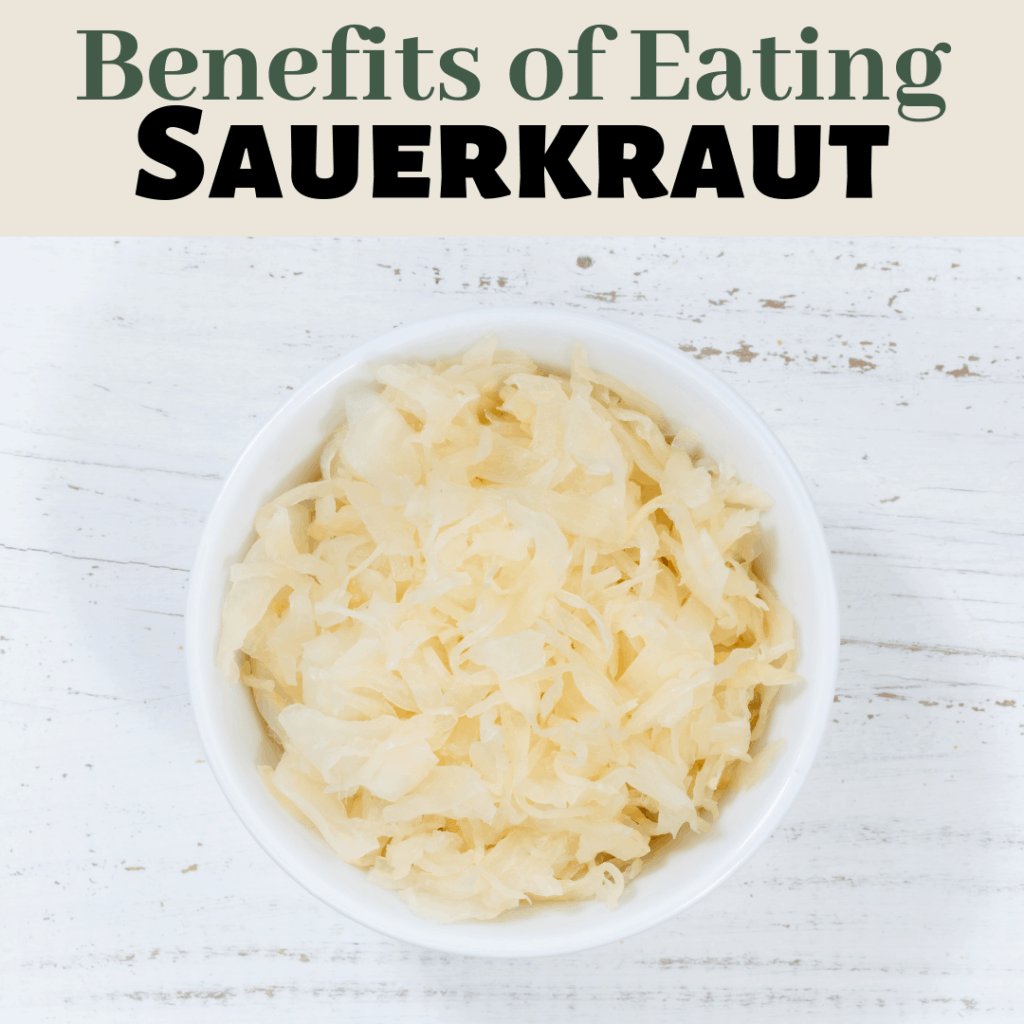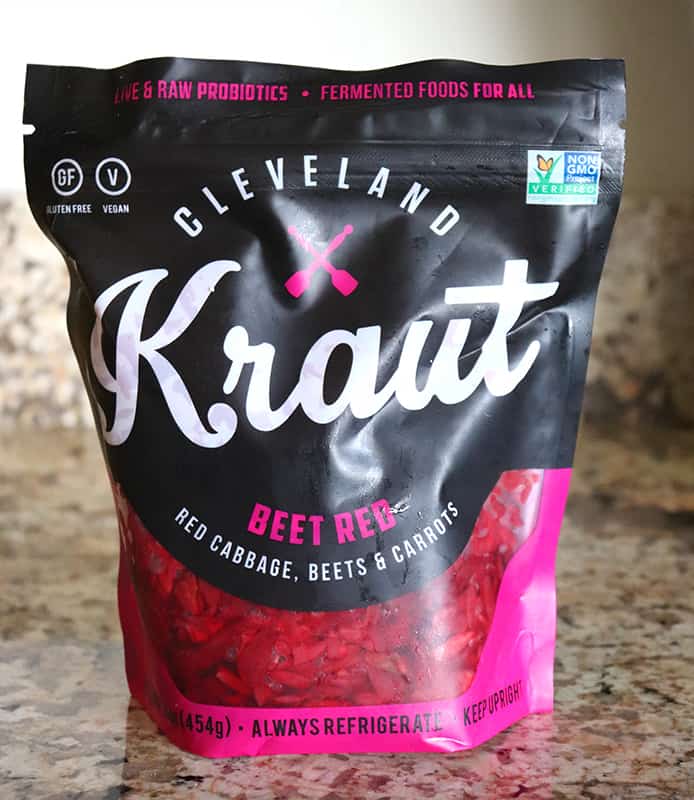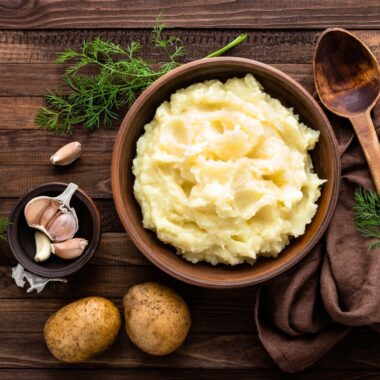If you’re curious about what sauerkraut benefits there are when you eat it, keep reading to learn more!

Table of Contents
What is Sauerkraut?
Sauerkraut is a type of fermented food that is made by combining shredded cabbage with salt, packing it in a container, and letting it ferment over several days or weeks.
Cabbage has beneficial bacteria on its surface, including lactobacillus. As it ferments, the bacteria on the cabbage will convert sugars in the cabbage to lactic acid – which naturally preserves the sauerkraut and inhibits the growth of harmful bacteria that could cause it to spoil.
During the fermentation process, live bacteria — or probiotics — are produced in the sauerkraut. Many of the health benefits related of eating sauerkraut are related to the probiotics made during the fermentation process.
What Bacterial Strains are Present in Sauerkraut?
This study did a DNA Fingerprinting on Lactic Acid bacteria in commercial sauerkraut fermentations and found the following species of bacteria present at various stages of fermentation:
- Leuconostoc mesenteroides
- Lactobacillus plantarum
- Pediococcus pentosaceus
- Lactobacillus brevis
- Leuconostoc citreum
- Leuconostoc argentinum
- Lactobacillus paraplantarum
- Lactobacillus coryniformis
- Weissella
- Leuconostoc fallax
Sauerkraut Benefits
So now that you know what sauerkraut is and all about the probiotics present, here are the sauerkraut benefits you may receive when consuming sauerkraut.
Better Immune System
It has been said that 70% of the immune system is located in the intestines.
Sauerkraut is a great source for nutrients and immune-boosting probiotics.
Sauerkraut can help improve the balance of bacteria in your gut, which can help keep the lining of the gut healthy. Why does that matter? Because a strong gut lining “prevents unwanted substances from leaking into your body”, and causing an immune response (source).
If you happen to get sick, probiotics may significantly reduce the duration of illness, such as respiratory infections, such as the common cold (source).
Improve Digestion
Consuming fermented foods, like sauerkraut, can help improve the balance of good and bad bacteria in the gut, which can help reduce diarrhea caused by antibiotic use (source).
According to this study, probiotics can support and improve digestive functions, while preventing irritable bowel syndrome.
Lower LDL Cholesterol
Eating foods with probiotics, such as sauerkraut, may help lower your LDL Cholesterol.
In this study with 43 participants over 56 weeks, probiotics were associated with reduced LDL Cholesterol.
This study showed that consuming Lactobacillus could reduce TC and LDL-C significantly.
May Promote Weight Loss
Certain strains of bacteria have been shown to suppress the absorption of fat.
Additionally, sauerkraut benefits weight loss because it is a naturally high fiber and low calorie, which can help you stay full and reduce your total caloric intake.
This article also suggests that probiotics may have body composition modifying properties. In a study of healthy, but overweight individuals who consumed yogurt (which is also a source of probiotics), participants showed a reduction in body fat. The results showed that “probiotic consumption may contribute to altered energy metabolism and body composition”.
And a fun fact: sauerkraut contains far more lactobacillus than yogurt – making it a superior source for probiotics (source).
Anti-carcinogenic Properties
In this literature review, there were multiple publications that demonstrated potential anticarcinogenc activity related to consumption of sauerkraut.
One of the studies focused on the effects in cabbage, and discovered that low-salt sauerkraut that contained L mesenteroides provided “highly beneficial antioxidant and anticarcinogenic compounds”.
The review also notes, “experiments found that high levels of glucosinolates, ascorbigen, and ascorbic acid decrease DNA damage and cell mutation rate in cancer patients, and sauerkraut is known to have a high content of these compounds”. It was also noted that the levels of these depends on the fermentation conditions of the cabbage.
Sauerkraut is Nutritious
In addition to the presence of probiotics, sauerkraut is naturally nutritious. 2 ounces of sauerkraut nutrition will provide:
- Calories: 20
- Fat: 0
- Carbohydrates: 4 grams
- Fiber: 2 grams
- Protein: 1 gram
- Sodium: 330 mg
- Vitamin C: 30% of the RDI
- Vitamin K: 45% of the RDI
- Iron: 6% of the RDI
- Folate: 6% of the RDI
- Potassium: 3% of the RDI
Where to Buy Sauerkraut
You can find sauerkraut at your local market, make it at home, or buy it online.
You’ll want to consider the quality of your sauerkraut to receive optimum health benefits. When I am buying sauerkraut, there are a few criteria I look for:
- It’s sold in the refrigerator section, not on the shelf. This is because shelf-stable sauerkraut is not live and won’t contain all of the beneficial probiotics.
- It should be raw.
- Make sure it’s unpasteurized.
- It only contains cabbage, salt, and other veggies. Your kraut shouldn’t contain vinegar, sodium benzoate, sodium bisulfate, or sugar.
My favorite store-bought sauerkraut is Cleveland Kraut. All of their sauerkraut is raw, unpasteurized, and lacto-fermented, so it’s full of probiotics and nutrients, and tastes great!

They have a huge line of flavors, including:
- Classic Caraway
- Beet Red
- Cabbage & Cukes
- Curry Kraut
- Roasted Garlic
- Whiskey Dill
More Fermented Foods
Now that you know how beneficial probiotics are to your health, you may want to try these other homemade fermented foods:





Leave a Reply